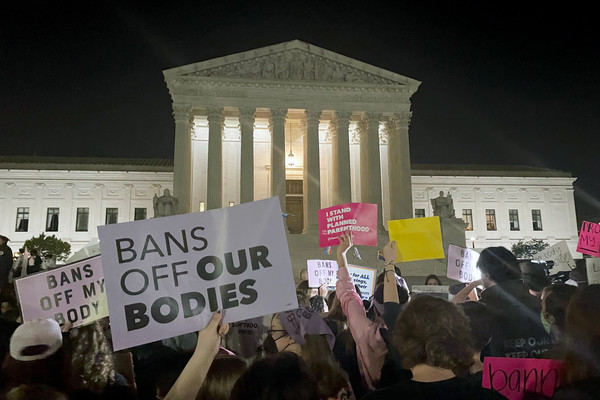Advocates of pro-choice in the US have spent more than half a century fighting to give women their right to body autonomy. However, the recent debate regarding the jurisdiction of abortion laws arising under a Supreme Court with conservative majority have caused apprehension in the pro-choice community that their decades of hard work will come undone. In this Spotlight, we discuss the history of debate on abortion laws since Roe v. Wade and implications of the decision to overturn the case.
The unprecedented leak of Supreme Court opinion revealed that Roe v. Wade, a landmark decision that granted constitutional protection for pregnant women’s liberty to choose to have an abortion without excessive government restriction, is about to be overruled. The result is not final, but it seems highly unlikely it will change given the current composition of the Supreme Court.

Once Roe v. Wade is overruled, abortion will be left to the political process. This will mean that each state can decide whether to allow or prohibit abortions. According to the Center for Reproductive Rights, about half the states could ban abortion outright; 13 of those states already have trigger laws restricting abortion that will take effect immediately when Roe v. Wade gets struck down. Women in these states who want abortions can travel to have abortion in places where it is legal, but those who cannot afford such travel will have to face a choice between an unsafe abortion or an unwanted child.
The end of Roe v. Wade would, above all, pose a threat to women’s health. Before abortion became legal, many women resorted to unsafe, back-alley abortions that could have life-threatening consequences. Many fear that post-Roe America would mirror the pre-Roe era. Being denied abortion also have long-term economic effects. Turnaway study, a longitudinal study of nearly 1,000 women seeking abortions, found that women who were turned away from getting an abortion worsened in health and economic status. Following an unintended pregnancy, many women face financial hardship to cover increased expenses for medical care, food, and child care. To make matters worse, many of the states likely to ban abortion are also the ones that have high levels of child proverty and offer the fewest welfare benefits for mothers and children.
According to the leaked draft written by Justice Samuel Alito, Roe v. Wade was “egregiously wrong from the beginning” because it protects a right that was not protected by the original meaning of the Constitution. But under such reasoning, countless other Supreme Court decisions protecting basic aspects of liberty could be invalidated as well. To name a few examples, it was not until Griswold v. Connecticut in 1965 that the Court held that the Constitution protects a right to purchase and use contraceptives; for a more recent case, Obergefell v. Hodges in 2015 led to the the Court’s decision that it was a constitutional right to strike down laws prohibiting same-sex marriage. The list goes on for newly defined and protected rights that cannot be found in the original constitution.
Justice Alito emphasized that “our decision concerns the constitutional right to abortion and no other right. Nothing in this opinion should be understood to cast doubt on precedents that do not concern abortion.” However, he also repeatedly suggests that any right not explicitly outlined in the Cconstitution must be deeply rooted in American history and tradition to be recognized by the court. It seems not irrational to fear that the Court’s decision to overturn Roe v. Wade could topple down the series of rights that have been defined and protected for decades. President Joe Biden also voiced his concern when he said that the Supreme Court’s decision went “far beyond abortion”.
Throughout American history, the Supreme Court has prided itself in following precedents that provide predictability and stability in the law. Overturning a decades old precedent that has a majority of public support could threaten its legitimacy and reliability as an institution. Thomas Jefferson famously said: “As new discoveries are made, new truths discovered and manners and opinions change with the change of circumstances, institutions must advance also to keep pace with the times.” The Supreme Court’s decision to overturn Roe v. Wade would be to go against the founding father’s advice, going against the tide of times rather than moving along with it.

